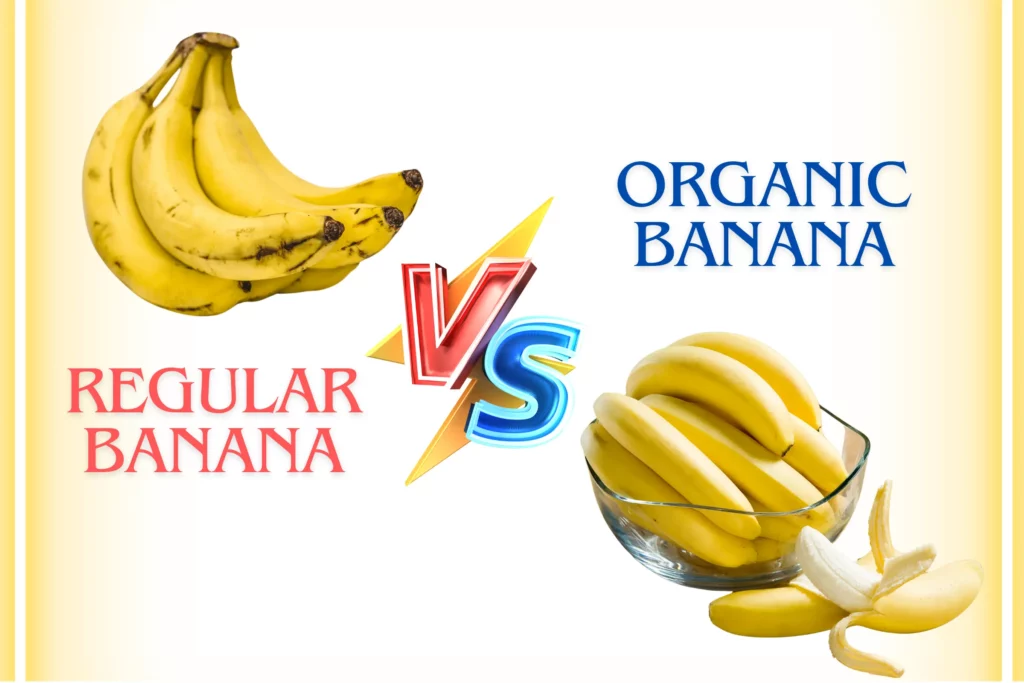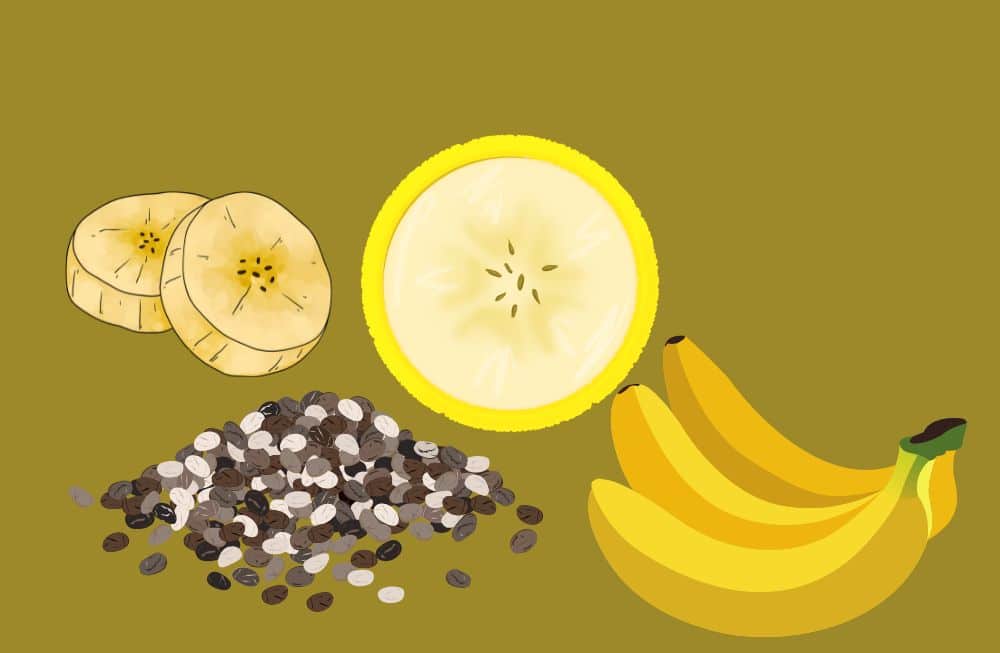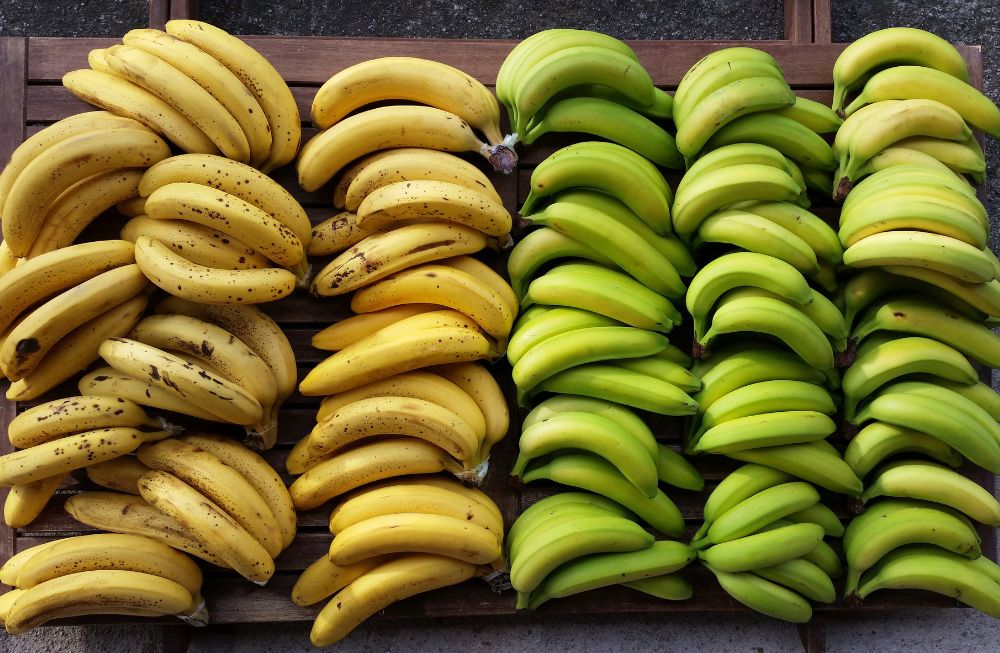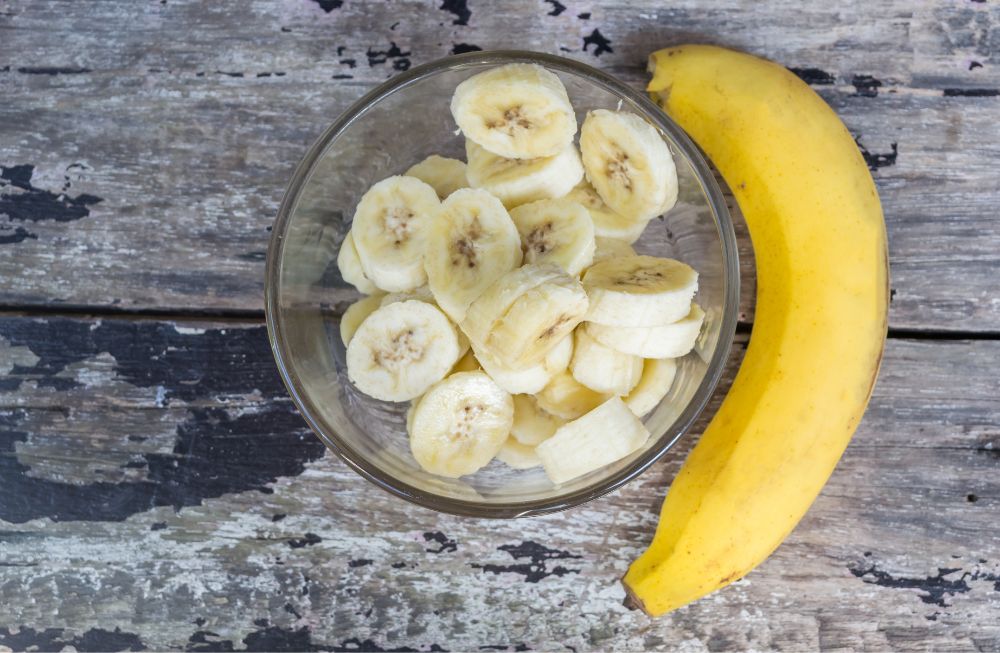Did you know that bananas are officially the world’s most popular fruit, with over 100 billion consumed annually? And it’s no surprise why their natural sweetness, portability, and nutritional benefits make them a favorite among people of all ages. However, it’s not all sunshine and tropical breezes in the banana world. As consumers become more aware of their food choices, questions arise, organic bananas vs regular bananas: which one is the right choice?
In this blog post, I will let you know the facts and myths surrounding these two contenders, explore their health benefits and determine which one you should choose.
So, what is the difference between organic bananas and regular bananas? Let’s differentiate between them:
| Factors | Organic Bananas | Regular Bananas |
| Calories & Nutrition | 89-105 calories, 1.1g Protein, 75% Water per 100g organic banana | 89g Calories, 22.48g Carbs, 2.2g Fiber per 100g regular banana |
| Taste | Slightly sweeter and richer flavor | Milder and less sweet |
| Cost | More expensive | Less expensive |
| Health Benefits | Lower pesticide residue, potentially higher antioxidant content | Same basic nutritional content, but potentially higher pesticide residue |
| Shelf Life | Typically shorter due to lack of preservatives | Longer due to use of preservatives |
| Availability | Less available and may be seasonal | Widely available year-round |
| Farming Practices | More sustainable farming practices required for certification | Conventional farming practices may vary |
Are organic bananas healthier than regular bananas?
Yes, organic bananas can be considered healthier than regular bananas to some extent.
Organic bananas are cultivated without the use of synthetic chemicals, pesticides, and fertilizers, which may contribute to the higher nutrient content in the fruit. In addition, organic farming practices help maintain soil health, which can result in more nutrient-dense produce.
However, the difference in nutritional content between organic and regular bananas is not substantial. Both types of bananas contain essential nutrients such as potassium, dietary fiber, vitamin C, and vitamin B6.
While organic bananas may contain slightly higher nutrient levels, overall, both organic and regular bananas offer similar health benefits, including reducing blood pressure, supporting digestion, and providing essential vitamins and minerals.
Do organic bananas taste different than regular bananas?
Yes, some people might find a subtle difference in the taste between organic and regular bananas.
This can be attributed to the way organic bananas are grown without the use of synthetic chemicals and fertilizers. These growing conditions can lead to organic bananas possessing a richer flavor and better texture compared to regular bananas. However, this difference is often subtle and may not be noticeable to everyone.
Taste can also be influenced by factors such as the ripeness of the fruit, storage conditions, and individual preferences. Whether you prefer the taste of organic or regular bananas boils down to personal preference.
Are organic bananas more expensive than regular bananas?
Yes, organic bananas are often more expensive than regular bananas.
This price difference is mainly due to the higher production costs associated with organic farming. Organic farms are typically smaller and not as efficient as conventional farms, leading to higher labor and input costs. Additionally, organic farmers do not use synthetic chemicals and fertilizers, which can result in lower crop yields and increased per-unit production costs.
Are organic bananas better for diet than regular bananas?
Yes, organic bananas can be considered a better option for those who want to include cleaner and more environmentally friendly products in their diet.
As mentioned earlier, organic bananas are grown without synthetic chemicals and fertilizers. This means that they might have a lower chance of containing pesticide residues compared to regular bananas.

For people with specific dietary concerns or sensitivities, choosing organic bananas can help minimize potential exposure to unwanted chemical residues. It is also important to note that the nutritional content of both organic and regular bananas is quite similar, and both types of bananas offer health benefits in a balanced diet.
Why are organic bananas more expensive?
Organic bananas have gained popularity in recent years, with more and more consumers choosing to purchase these over conventional bananas. However, it has been observed that organic bananas often come with a higher price tag. This might make one wonder why these eco-friendly options are significantly more expensive than their non-organic counterparts.
The primary reason for the higher cost of organic bananas is the difference in farming practices when compared to traditional methods. Organic farming focuses on avoiding harmful pesticides, fungicides, and other chemical substances during cultivation.
Instead, they rely on natural processes and environmentally friendly alternatives for pest control and fertilization. These techniques demand extra labor efforts as well as specialized resources, which inevitably lead to increased production costs.
Another aspect contributing to the elevated price is certification expenses. Obtaining organic certification is not a one-time expense but rather an ongoing process that requires constant monitoring and adherence to strict regulations set by certifying agencies.
Marketing and distribution present further challenges in maintaining competitive prices for organic products like bananas. The market segment for organically grown produce tends to be smaller than that of conventionally grown items; hence it cannot benefit from economies of scale that would typically lower distribution costs per unit sold.
In summary, several reasons contribute to making organic bananas more expensive than conventional ones:
- The utilization of environmentally friendly farming practices involves additional labor input and specific resources.
- Costs incurred in obtaining certifications required for labeling products “organic.”
- Inefficient marketing strategies need improving mainly because smaller market segments cannot take advantage of bulk buying when distributing commodities like bananas.
- Consumer willingness to pay a premium for perceived health benefits and environmental considerations provided by purchasing organically cultivated fruits over their chemical-laden counterparts.
Despite the higher cost, conscious consumers continue to opt for organic bananas due to the various advantages they offer. The increasing demand drives more improvements in organic farming practices, certification systems, and distribution channels that could lead to a more cost-effective future for these eco-friendly food items.
Is it worth buying organic bananas?
Yes, buying organic bananas may be worth it to some consumers depending on their personal preferences and values related to health, environment, and ethical considerations.
Organic bananas offer potential nutritional advantages, reduce exposure to pesticides and chemical fertilizers, and support more environmentally-friendly farming practices. However, the higher cost of organic groceries can be a significant drawback.
From a health perspective, research suggests that conventional bananas often contain pesticide residues on their skins (despite their thick peels). Washing the fruit thoroughly before eating may remove some of these chemicals from the surface of the peel if you avoid consuming it directly. Ensuring minimal pesticide exposure may still appeal particularly to those with young children or compromised immune systems.
Organic produce may also provide modestly higher levels of certain nutrients and antioxidants compared to conventionally-grown counterparts. However, this difference in nutrient content for organic versus non-organic bananas has not been rigorously researched as much as with other fruits such as apples or strawberries.
If nutrition is your primary concern when choosing whether or not to purchase organic products, integrating a wide variety of fresh fruits and vegetables into your diet would likely have a more significant impact than solely focusing on organically-grown options.
Environmentally conscious consumers may lean toward purchasing organic bananas due to concerns about environmental degradation caused by conventional agricultural practices such as deforestation for land use conversion or indiscriminate use of agrochemicals polluting water sources. Organic farming practices stress preserving soil fertility through crop rotation methods rather than applying chemicals that cause long-term harm to ecosystems in areas where crops are grown.
Despite these advantages, the costs associated with organic bananas can be significantly higher than their conventional counterparts, largely due to factors such as lower crop yields and more intensive labor requirements. For individuals on a tight budget or for those who consume bananas in large quantities, these increased costs might not be justifiable.
Are organic bananas gassed?
No, Organic bananas are not gassed with synthetic ethylene, a common practice used in the conventional banana industry to facilitate uniform ripening during transportation and storage. Organic standards prohibit the use of artificial ripening agents, such as ethylene gas.
It is important to note that bananas naturally produce ethylene gas as they ripen. This natural process occurs in both organic and conventional bananas and is necessary for the fruit to develop properly. This differs from the artificial application of ethylene gas, which is used to speed up and control the ripening process in conventionally grown bananas.
In place of synthetic ethylene, organic banana growers often rely on other methods to manage ripening during storage and transportation, including temperature and humidity control. These practices help to ensure that organic bananas reach consumers with an appropriate level of ripeness while still adhering to organic standards.
How are organic bananas grown?
Organic bananas are grown organically in various places, including the Indian sub-continent, Colombia, Mexico, and the ACP Zone (Africa, Caribbean, and Pacific Group of States). But there is a way to grow bananas organically; here is how, although the process is a bit complicated.
Organic banana farming involves growing bananas without the use of synthetic chemicals or pesticides, focusing on natural materials and methods to feed the plants and produce edible bananas. Here is a step-by-step formula for growing organic bananas as a farmer:
Location: A location that stays warm throughout the growing season, as bananas require a consistently warm temperature for good growth.
Soil: Break the soil up with the edge of a garden hoe and dig a hole as deep and as wide as the root ball of the banana plant.
Plant the banana: Place the root ball in the hole and pack the soil around the plant roots. Space other banana plants about 8 to 12 feet apart, depending on the mature size of the variety.
Mulch: Apply a layer of organic mulch around the base of the plant to help retain moisture, suppress weeds, and provide slow-release organic nutrients.
Planting time: The time of planting depends on climatic conditions and the availability of water. In areas with heavy and continuous rains, planting should be done after the rainy season (September-October), while in areas with less rainfall, planting can be done in June-July. In irrigated areas, planting is done in February-March, and in hilly areas, in April.
Spacing: The spacing adopted by organic banana cultivators is about 1.5 m x 1.5 m and 1.5 m x 1.8 m.
Fertilization: Use organic fertilization practices such as intercropping with leguminous crops, coffee, vanilla, cocoa, and tropical fruits to improve the soil’s nutrient content.
Watering: Water the banana plant once a week during the first growing season after planting and twice a week during hot, dry conditions. Cut the amount of water provided once the plant has established its roots.
Feeding: Start feeding the banana plant each year in the spring before new growth appears. Make your own organic tea and feed a 10% solution to the roots every two to three weeks. Feed the plant less in the fall.
Weed control: Hand weeding by giving 4-5 surface diggings (depending on weed growth) will provide good weed control. Avoid deep digging, and do not disturb the soil after plants start growing.
How are conventional bananas grown?
Typical bananas are produced by applying artificial pesticides, herbicides, and fertilizers for pest control and plant growth stimulation. Frequently relying on these approaches involves large amounts of pesticides that can cause harm to both the environment and human health.
The cultivation of bananas on extensive monoculture farms necessitates the application of substantial quantities of pesticides, herbicides, fungicides, and artificial fertilizers to preserve their health.
Unlike conventionally grown bananas which rely on synthetic pesticides and herbicides for their growth, Organic Bananas do not use such methods and grow naturally. In place of chemical-based methods, organic farmers employ natural techniques for plant development and pest management.
Final Thoughts: Are organic bananas better than regular bananas?
When comparing organic bananas vs regular bananas, obviously organic bananas are better than regular bananas. It is undeniable that organic bananas offer certain benefits. Grown without any synthetic pesticides or fertilizers, they offer potential advantages to both the environment and your physical condition. Farmers who practice organic farming often promote sustainable agriculture and fair wages.
Regular bananas are usually more convenient and reasonably priced for a larger group of buyers. Grown conventionally or not, these crops still possess valuable nutrients and satisfying flavors.
Deciding between organic and regular bananas is based on one’s values, budget, and personal tastes. Those who want to support ethical farming practices and avoid synthetic chemicals may find that organic bananas are the better option.







